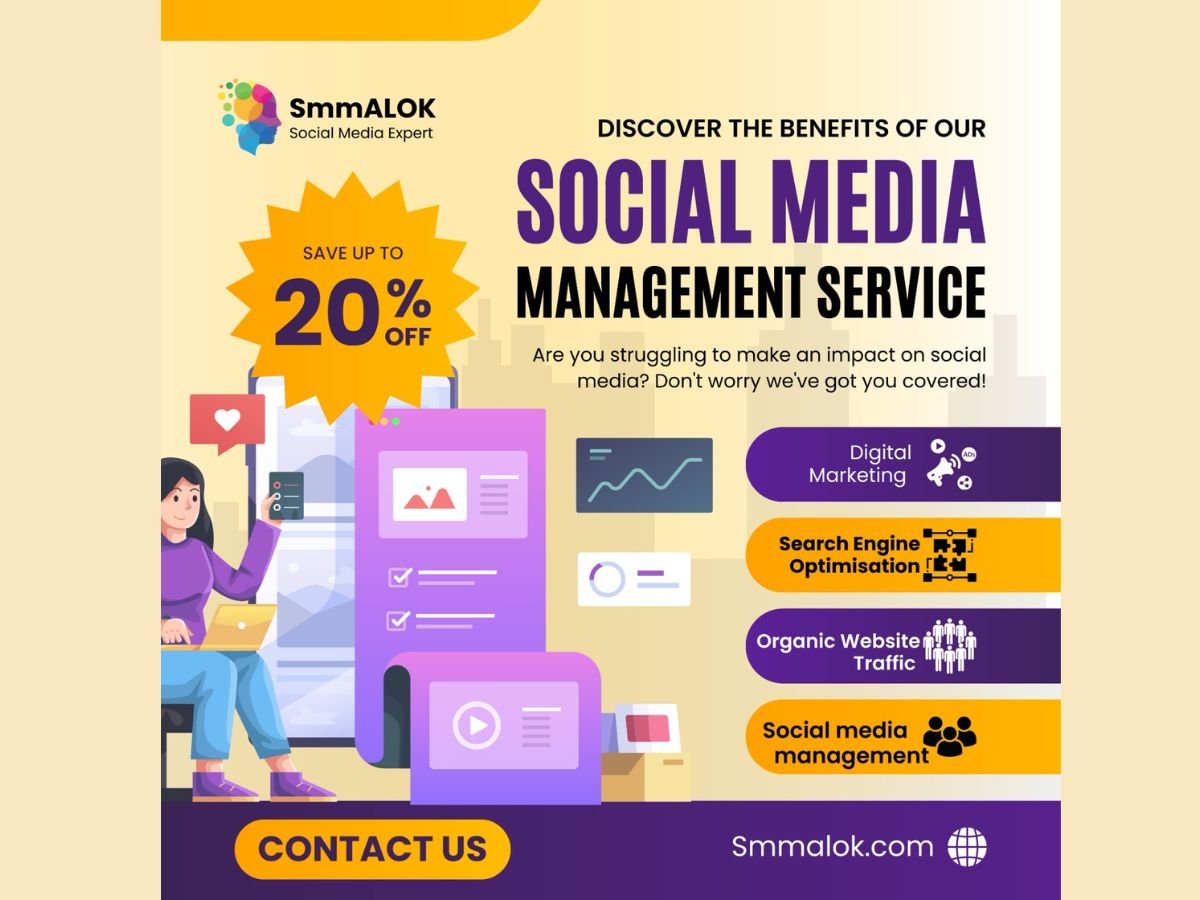Search Engine Optimization (SEO) involves improving a website’s visibility on search engines like Google, Bing, and Yahoo. The goal is to attract more visitors by achieving high rankings on search engine results pages . This extensive guide aims to take you on a journey through how Smmalok, acknowledged as India’s best search engine optimization agency, is at the forefront of this evolution. They achieve this by harnessing the power of AI, machine learning, and innovative, customized strategies to deliver outstanding results.
Keyword Research: Identifying the terms and phrases potential customers use to find products or services.
- On-Page SEO: Optimizing individual web pages to rank higher. This includes using keywords effectively, optimizing title tags, meta descriptions, headers, and content quality.
- Off-Page SEO: Building backlinks from reputable sites to increase the site’s authority.
- Technical SEO: Improving the backend structure and foundation of a website. This includes site speed, mobile-friendliness, indexing, crawlability, and security.
- Content Creation: Producing high-quality, relevant content that meets the needs of the target audience.
- Local SEO: Optimizing a website for local search results, essential for businesses with a physical location or those serving specific geographic areas.
- Analytics and Reporting: Using tools like Google Analytics and Search Console to track and measure SEO performance.
Digital marketing
Digital marketing encompasses all marketing efforts that use an electronic device or the internet. Businesses leverage digital channels such as search engines, social media, email, and websites to connect with current and prospective customers. Here are the main components of digital marketing: Look no further than Smmalok. We are a leading Digital marketing firm that has been providing top-notch Digital marketing services to clients from all over the world for more than two decades now. Our team of Digital marketing experts are well-versed in all the latest techniques and algorithms that can help your website rank higher on search engines.
- Search Engine Optimization (SEO): Optimizing your website to rank higher in search engine results pages, increasing organic traffic.
- Content Marketing: Creating and distributing valuable, relevant content to attract and engage a target audience. This includes blog posts, videos, infographics, and more.
- Social Media Marketing: Promoting your brand and content on social media platforms like Facebook, Instagram, Twitter, LinkedIn, and others to increase brand awareness and drive traffic.
- Pay-Per-Click (PPC) Advertising: Running paid ads on platforms like Google Ads and social media sites, where you pay a fee each time your ad is clicked.
- Email Marketing: Using email to communicate with your audience, promote products or services, and build customer relationships.
- Affiliate Marketing: Partnering with other businesses or individuals to promote your products or services in exchange for a commission on sales generated.
- Influencer Marketing: Collaborating with influencers who have a significant following to promote your brand.
- Marketing Automation: Using software to automate marketing tasks, such as email campaigns, social media posting, and ad campaigns.
- Online PR: Managing your online reputation through strategies like responding to customer reviews, engaging with your audience on social media, and promoting positive media coverage.
- Conversion Rate Optimization (CRO): Enhancing your website and content to increase the percentage of visitors who take desired actions, such as making a purchase or filling out a form.
- Analytics and Data Analysis: Using tools like Google Analytics to track and measure the performance of your digital marketing efforts, helping you make data-driven decisions.
Social media management
Social media management involves creating, scheduling, analyzing, and engaging with content posted on social media platforms like Facebook, Instagram, Twitter, LinkedIn, and more. Effective social media management can help businesses increase brand awareness, improve customer engagement, drive traffic, and boost sales. Smmalok is an all-inclusive SMM provider. We function across multiple platforms like Facebook, Pinterest, Google +, Twitter, Instagram, Snapchat etc. Our service list includes the mentioned platforms but is not limited to them.
If you have any other social media which you want to get catered to specifically, talk to our consultants NOW!
Best Practices for Social Media Management:
- Consistency: Maintain a consistent posting schedule and brand voice across all platforms.
- Quality Over Quantity: Focus on creating high-quality, valuable content rather than just posting frequently.
- Stay Current: Keep up with social media trends, platform updates, and algorithm changes.
- Engage Authentically: Engage with your audience in a genuine and meaningful way.
- Use Data: Make data-driven decisions to optimize your strategy and improve results.
- Collaborate: Partner with influencers and other brands to expand your reach.
- Be Visual: Use eye-catching visuals to grab attention and boost engagement.
- Educate and Entertain: Provide a mix of educational, entertaining, and promotional
Organic reach
Organic reach refers to the number of unique users who see your content without paid promotion. It’s a crucial aspect of social media marketing, as it measures how well your content performs on its own merit. Increasing organic reach can be challenging due to algorithms that prioritize content differently across platforms, but it is vital for building an engaged and loyal audience.
What Is Organic Reach? – Smmalok Organic Reach. Social Media Definitions: The Ultimate Glossary of Terms & Definitions. See the most Popular Social Media marketing Glossary Terms.
Improve Organic Reach:
- Quality Content:
- Understand Your Audience:
- Engage with Your Audience:
- Consistency:
- Leverage Hashtags:
- Use Stories and Live Videos:
- Optimize for Each Platform:
- Post at Optimal Times:
- Collaborate with Influencers:
- Encourage Sharing:
- Cross-Promote Content:
- Monitor and Adapt:
Organic Website traffic
Organic website traffic refers to the visitors who come to your website through unpaid search results from search engines like Google, Bing, or Yahoo. Increasing organic traffic is a key goal of SEO (Search Engine Optimization) because it leads to more potential customers finding your site naturally. Here are strategies and best practices to improve organic website traffic:
Strategies to Increase Organic Website Traffic:
- Keyword Research:
- On-Page SEO:
- High-Quality Content Creation:
- Technical SEO:
- Backlink Building:
- Local SEO:
- User Experience (UX):
- Content Marketing:
- Analytics and Monitoring:
- Optimize for Featured Snippets:
Instagram Facebook YouTube & All social media profiles management
Managing multiple social media profiles effectively requires a strategic approach, consistent effort, and the use of various tools to streamline processes. Here are comprehensive steps and best practices for managing Instagram, Facebook, YouTube, and other social media profiles:
1. Develop a Social Media Strategy
Define Goals:
Identify Target Audience:
Choose the Right Platforms:
2. Content Planning and Creation
Content Calendar:
Content Types:
Brand Consistency:
3. Platform-Specific Strategies
Instagram:
- Focus on high-quality visuals and compelling captions.
- Utilize Instagram Stories, Reels, and IGTV for varied content formats.
- Use relevant hashtags to increase discoverability.
- Engage with followers through comments, likes, and direct messages.
- Collaborate with influencers and run contests or giveaways.
Facebook:
- Post a mix of content: text updates, images, videos, and links.
- Use Facebook Live for real-time engagement.
- Create and participate in Facebook Groups to build a community.
- Leverage Facebook Ads for targeted advertising.
- Regularly update your Facebook Page with important information.
YouTube:
- Create high-quality, informative, and entertaining videos.
- Optimize video titles, descriptions, and tags for SEO.
- Use custom thumbnails and engaging intros.
- Encourage viewers to subscribe, like, and comment.
- Share your YouTube videos on other social media platforms.
- Consistently upload content to maintain audience interest.
Event management
Start your event management work with Smmalok. You will get better prices than others, so contact Smmalok today. Event management involves planning, organizing, and executing events such as conferences, trade shows, concerts, corporate meetings, and more. Successful event management requires attention to detail, effective communication, and thorough planning. Here are the key steps and best practices for managing events:
Key Steps in Event Management:
- Define Event Objectives and Goals:
- Create an Event Plan:
- Budgeting:
- Choose a Venue:
- Assemble a Team:
- Develop a Timeline:
- Logistics and Operations:
- Marketing and Promotion:
- Ticketing and Registration:
- Engagement and Communication:
- Event Execution:
- Post-Event Activities:
Video editing
Give the work of video editing to Smmalok and you will get your video edited before your time. Video editing is the process of manipulating and rearranging video shots to create a new work. This involves cutting segments (trimming), re-sequencing clips, adding transitions, effects, music, and more. Effective video editing can enhance the storytelling, visual appeal, and overall quality of the video. Here are the key steps and best practices for video editing:
Key Steps in Video Editing:
- Pre-Production Planning:
- Organize Media Files:
- Set Up the Project:
- Create a Rough Cut:
- Fine-Tune the Edit:
- Add Visual Effects and Graphics:
- Incorporate Audio:
- Colour Correction and Grading:
- Review and Revise:
- Export the Final Video:
Contact SMMALOK
If you have any objection to this press release content, kindly contact pr.error.rectification@gmail.com to notify us. We will respond and rectify the situation in the next 24 hours.




